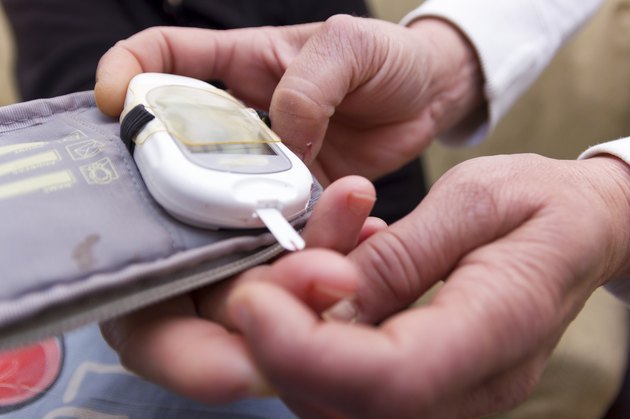
Glucose is required by the body to maintain life. However, it is possible to have too much of a good thing. Hyperglycemia, or high blood glucose levels, may be due to diabetes, medications, stress, illness, hyperthyroidism, Cushing syndrome, pancreatitis or pancreatitis cancer. It is important to know the symptoms of high blood glucose and to see your doctor immediately if you experience any signs to prevent further complications.
Glucose Levels
据国家糖尿病和消化疾病研究所和肾脏疾病称,禁食血糖试验通常是确定您是否具有高血糖水平的第一步。在早上完成至少八小时后,它是最可靠的。正常水平应低于99 mg / dl。当水平介于100至125mg / dL之间时,诊断前糖尿病患者。如果您的空腹血糖水平为126mg / dl或以上反复测试,则确认糖尿病。随机或无快速的血糖水平超过200mg / dl可能意味着您也有糖尿病。
Symptoms
According to the American Diabetes Association, symptoms of high glucose levels include frequent urination, extreme hunger and thirst, extreme fatigue and irritability, unusual weight loss, frequent infections, blurred vision, tingling and numbness in the hands and feet, cuts and bruises that take a long time to heal, and recurring bladder, gum or skin infections. It is possible for you to have high glucose levels with no symptoms, so be sure to have your doctor check your levels at your regular physical.
达ngers of Hyperglycemia
The danger of continuously high blood glucose or hyperglycemia is that sugar coats the red blood cells, causing them to become stiff and "sticky". These cells interfere with proper blood circulation and can cause buildup on blood vessels and organs. The small, fragile blood vessels of the eyes, feet and kidneys are the most vulnerable, and problems are usually first noticed in these areas. If hyperglycemia is not controlled, it can eventually lead to heart disease, stroke, kidney failure, vision loss, tooth loss, stroke, nerve damage and loss of limbs due to circulation problems.
Treatment
Lifestyle changes and medications are usually prescribed to help lower blood glucose levels. Following a healthful eating plan will help you control your blood glucose and prevent you from developing further complications. Your diet should consist of vegetables, whole grains, fresh fruit, lean meats and dairy, legumes and seeds, with limited or no processed foods. Consult a diabetes expert or dietitian to help develop a plan that works for you.